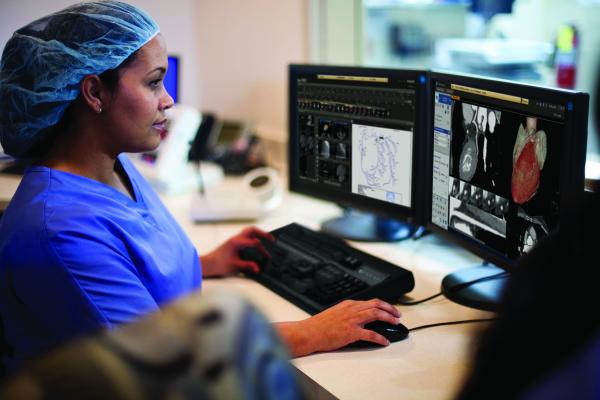
The IntelliSpace Cardiovascular CVIS from Philips Healthcare, being used in the cath lab.
Cardiologists need information from multiple sources to make accurate diagnoses and plan interventional therapies. The clinical and administrative staff at Palm Beach Gardens Medical Center have met this challenge by implementing across their service line a comprehensive cardiology information system (CVIS) — IntelliSpace Cardiovascular from Philips Healthcare.
The cardiovascular information system integrates data from diagnostic and clinical IT applications, including the electronic medical record (EMR) system at the medical center in Palm Beach Gardens, Florida. It provides access to these data via the web.
"Cardiologists can access data really easily at any time and from wherever they are," said Claudia Escobedo, administrative director for cardiopulmonary and rehabilitation services at Palm Beach Gardens Medical Center. "The information just flows."
By assembling data from multiple sources, IntelliSpace Cardiovascular helps the care team develop a holistic view of the patient which is reflected on a unique chronological timeline representation of the patients’ episodes of care.
The system’s ability to interface with other clinical systems takes it beyond just the realm of a Cardiology PACS solution to a comprehensive, patient-centric cardiovascular information system.
"Because of IntelliSpace Cardiovascular, we are able to manage and put data together efficiently and clearly for our physicians," Escobedo said.
While Philips' cardiovascular information system is "very user friendly...very easy to operate," the staff who use the system have become highly skilled, she said, crediting Philips with having helped them acquire those skills. "The company did training for both physicians and technologists. IT has been very supportive."
Data Consolidation
Palm Beach Gardens Medical Center is among the first sites to use the the latest version of this advanced system. (Version 2.2 began shipping routinely in April 2017.)
Cardiologists at the Medical Center use IntelliSpace Cardiovascular to access echo and cardiac cath images, as well as to generate final clinical reports via a structured reporting methodology. They also use the information system to access and review the patient’s cardiac care history across their continuum of care. Consolidating results from the EMR and other clinical systems streamlines information flow and may help improve patient care, according to Escobedo.
Through Philips' cardiovascular information system, staff can interact with the data and images in an efficient, intuitively understandable web-enabled environment. Although cardiologists at the medical center have been able to read images from within the department "for quite some time, it has been very limited," she said. "Now they are no longer tied to a workstation in a corner in a room."
Quick and easy remote access to patient data and images helps us to reduce the time patients must wait for diagnosis and treatment. “Because images are directly attached to orders in the EMR, you know that the information is there — consistently and correct," Escobedo said.
IntelliSpace Cardiovascular allows physicians to compare cardiac cath and echo images, she said. Doing so is very important at Palm Beach Gardens Medical Center. "We do a lot of front-line procedures that require cardiovascular imaging," Escobedo noted.
Care Evolves
Open-heart surgery was first performed at Palm Beach Gardens Medical Center 15 years after the center opened in 1968. Today it has evolved into a tertiary care facility with 199 beds, offering a full spectrum of health care services. But the center has not lost touch with its cardiovascular roots, hosting the Heart and Vascular Institute of which the Valve Clinic is part. Here cardiologists replace defective heart valves that can lead to heart failure, stroke, blood clots or death.
The Valve Clinic benefits especially from IntelliSpace Cardiovascular, said Deirdre Thompson, the medical center's lead echo tech. Patients being considered for valve replacement are routinely evaluated with transesophageal ultrasound (TEE) and often cardiac cath. Based on these studies, cardiologists precisely tailor replacement valves and plan minimally invasive procedures for their implantation.
Zeroing In
A key attribute of IntelliSpace Cardiovascular is its zero footprint architecture, which turns computing devices at Palm Beach Gardens Medical Center into displays of patient data and processed images. "We are very physician driven," Escobedo said. "It is important for our physicians to have what they need when they need it. So we don't want them tied to a workstation somewhere."
With a zero footprint architecture, clinical data and images are processed within the cardiology department from the remote user and transmitted on demand over the web to the clinicians workspot. Inherently interoperable, this technology decreases deployment costs and saves time that would have otherwise been spent interfacing IT systems. It also allows the facility to use investments already made in existing clinical systems, thereby helping to keep costs down and promoting efficiency.
In these ways, IntelliSpace Cardiovascular helps Palm Beach Gardens Medical Center reap the benefits of a streamlined vendor strategy, while allowing a diverse ecosystem of applications, according to Escobedo. It integrates data from clinical systems and achieves a simplified IT footprint, yet provides cardiologists with the advanced tools they have come to depend on.
"We are all about uniformity and simplicity here," she said. "There is good (information) flow and the information is there for physicians."
Through this consolidation of data, IntelliSpace Cardiovascular creates a panoramic view of a patient's care; enhances clinical workflow and patient management; and simplifies the information technology environment, according to Escobedo.
This promotes operational efficiency, she said, as it helps care providers and their patients.



 January 28, 2026
January 28, 2026 









